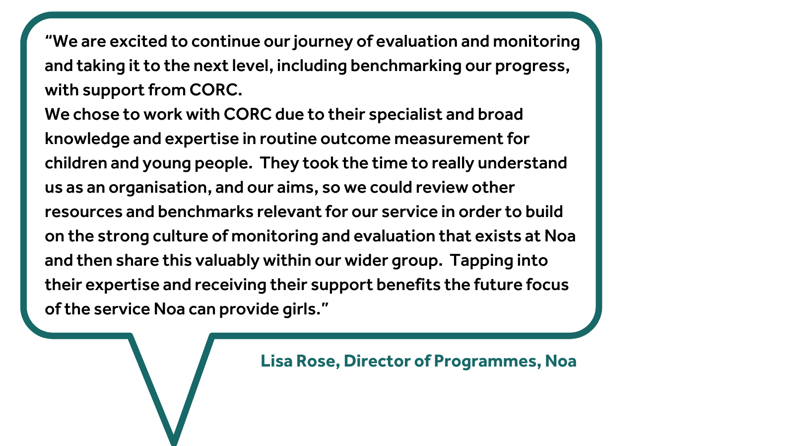Choosing the right outcome measures: working with Noa
Noa is a voluntary sector organisation that supports girls from the Orthodox Jewish community aged 12-24 with their mental health and wellbeing through practical, therapeutic and emotional support.
Noa recently joined CORC and we were excited to support them by delivering a tailored workshop on routine outcome measures to staff as part of their membership.
We met with Noa, as part of their continuing journey in evaluation, to review their current system of routine outcome monitoring. Noa has a strong ethos of using outcome measures to look at the progress of beneficiaries and for evaluating the efficacy and success of the service. However, Noa wanted to review if there were further improvements that they could make to their standardised measures. We discussed their key outcomes and how these could be monitored through a range of measures of symptoms, functioning and goals. After sharing a variety of options, we supported them to select several measures which seemed appropriate for their service users, to then share with their wider team.
Choosing the measures
The measures chosen as most appropriate were the Revised Children’s Anxiety and Depression Scale (RCADS) because the subscales lent themselves well to the varying mental health and wellbeing difficulties service users experienced. The ability to use the full scale at assessment, and appropriate shorter subscales during the programme was an important factor in the selection process. The Clinical Outcomes in Routine Evaluation (CORE-OM, CORE-10, YP-CORE) was similarly considered for the shorter session-by-session version to complement the longer tool, along with its measurement of risk. Finally, Goals Based Outcomes (GBOs) were considered to enable clinicians to collaborate with service users on goals that were important to them. There are lots of outcome measures available to explore on our website, and these three were the most relevant based on Noa’s context and the children and young people that they work with.
Delivering the workshop
We facilitated a tailored workshop with Noa's wider team, focused on training for the individual measures but also to enable open discussion about how the selected outcome measures could be integrated into their established system of routine outcome monitoring. Key areas of the service were represented at the meeting, including the senior leadership team, clinical managers and the data lead. We began with a theory of change which aimed to describe how, and why, the service achieves its intended outcomes. From this, we focused in on RCADS, CORE and GBOs to look at how they could be used alongside routinely collected data for routine outcome monitoring. For each measure, we considered the suitability for service users and scoring criteria, exploring the RCADS scoring programme and training on how to introduce goal-based measures to children and young people. Participants were given the opportunity to reflect on current practice, and the potential benefits and barriers to use.
We also considered how to benchmark collected data, which can be an area of challenge for voluntary sector organisations. We explored benchmarking against CORC comparator data, which provides the change reported by children and young people for a number of outcome measures including RCADS and YP-CORE.
